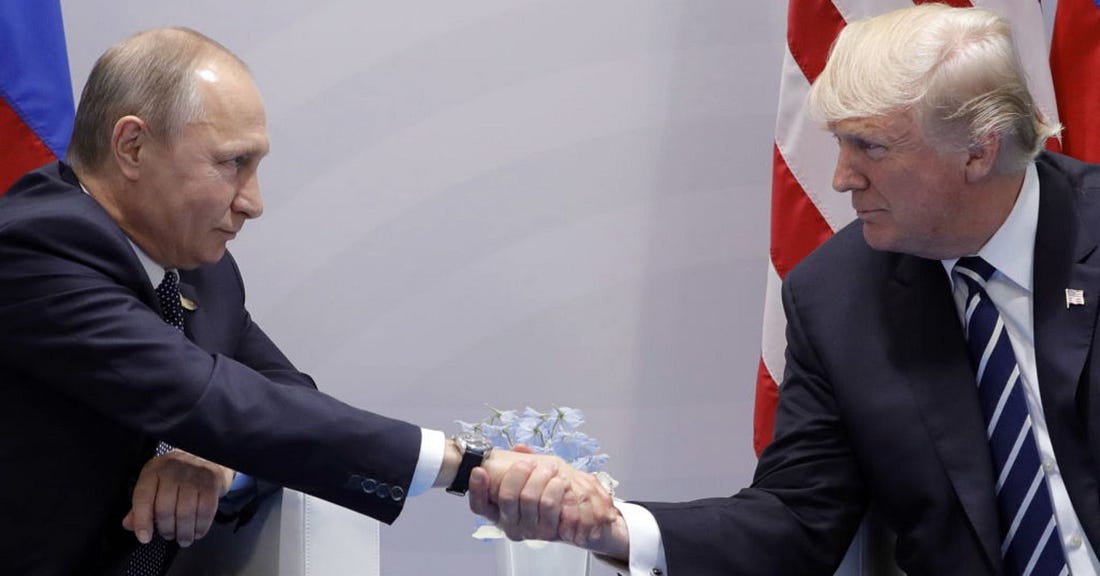Nov. 9, 2016 = Sept. 11, 2001
Imagine George W. Bush shaking Osama bin Laden's hand. You can't.

Is that fair?
I have no idea. But the meeting comes three days after the US Department of Justice announced the indictment of a 12 Russian spies who worked to sabotage Hillary Clinton in order to help Trump. This is first time Special Counsel Robert Mueller connected the Trump campaign—specifically an unnamed person with access to it—to the Russian military. Previous indictments were about financial crimes or obstruction or "information warfare.” This time is different. This time, the Kremlin is directly involved. Because of that, the center of gravity appears to be shifting.
Since the election, partisans could be trusted to bring up the T-word. Because Trump lost the popular vote, partisans reliably alleged that his presidency was illegitimate. People with deep knowledge of the way authoritarianism slowly and then quickly overwhelms democratic norms and institutions have been using "war" in their writing. To people like me who are naturally skeptical and to people with an interest in appearing nonpartisan, all of this felt rather panicky and hyperbolic.
That changed for me months ago. I think I noticed a sharpening of rhetoric Friday from middle-of-the-road types after Deputy Attorney General Rod Rosenstein announced the indictments. The fact that the Kremlin itself is involved appears to have been pivotal. I'm seeing "war" more. I'm seeing "attack" more. I'm even seeing comparisons to something that would have felt false and insane in the weeks and months after the 2016 election: to the terrorist attacks of September 11, 2001.
I was frankly stunned to read in the Times Saturday that Director of National Intelligence Dan Coats himself put these two events in listeners’ minds. He warned Congress on the same day that 12 Russian spies were indictment that we face the same level of threat that we did just before 9-11. The indictments, he said, illustrated per the Times "Moscow's continuing strategy to undermine the United States' democracy and erode its institutions. Coats said: "The warning lights are blinking red again. Today, the digital infrastructure that serves this country is literally under attack."
Let's connect some dots.
Imagine what the reaction would be if President George W. Bush had decided that instead of seeking to bring Osama bin Laden to justice for murdering 3,000 Americans in a day, he held a summit with the terrorist, shook his hand, and said that he really thinks the world would be a better place if Al Qaeda and the US could get along. Worse, that he said that he does not believe the consensus that bin Laden attacked us.
It's not possible to imagine that. I mean, I can’t imagine that. Rightly or wrongly, George W. Bush well and truly did put America’s interests first. But such betrayal is happening now. Right now. After Friday's indictments, Senate Minority Leader Chuck Schumer called on the president to cancel his Finland meeting, because meeting with Putin, Schumer said, would reward the very man who attacked our country.
Is Twitter a reliable indicator of public sentiment? Well, we are talking about Twitter, after all. Anyway, I doubt Dan Coats, a Republican appointed by Trump, is going to use the word "treason" any time soon. But a pattern seems to be emerging.
The more we know about Mueller’s probe, the more Trump confirms partisan and nonpartisan allegations. Such a dynamic will have a tipping point. The question might not be about Twitter. It might be about when the mainstream views Trump clearly.
Programming note
I need your help. Please send this newsletter to everyone you know who cares about democracy and small-r republican values. It won’t be free for long, but everyone who signs up now, gets in for free. Many thanks.
Patriotically yours, JS.


